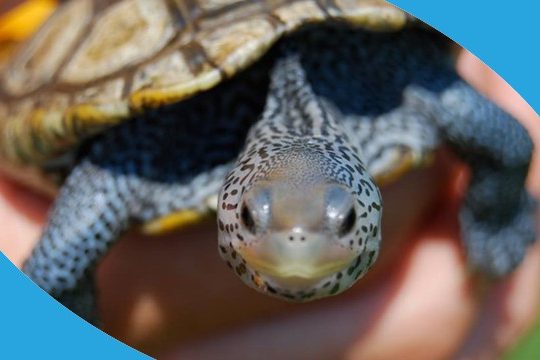Diamondback Terrapin Conservation Program
The Wetlands Institute (www.wetlandsinstitute.org), is a non-profit organization located in Stone Harbor, New Jersey, whose mission is to study, preserve and protect wetlands and coastal ecosystems. One of their programs is the Diamondback Terrapin Conservation Program. Diamondback terrapins, (“turtles”), (Malaclemys terrapin) inhabit the brackish waters of the Atlantic and Gulf coasts of the United States. More closely related to freshwater turtles than to marine turtles, diamondback terrapins possess unique adaptations for life in water that varies widely in salinity. For this reason, terrapins are the only species of turtle that live their entire life in coastal salt marshes.
The diet of M. terrapin consists largely of invertebrates, such as fiddler crabs, blue claw crabs and blue mussels. Terrapins are an important predator of the salt marsh snails that feeds on salt marsh cord grass (Spartina alterniflora). When terrapins, and other predators, are removed, snails overgraze the cord grass leaving a barren mudflat (Silliman and Bertness 2002). For this reason, healthy terrapin populations are essential for maintaining salt marsh ecosystems.
Across their range, diamondback terrapin populations are in decline. Major threats to terrapins include commercial collection for food, habitat destruction, drowning in fishing gear, and road mortality. Given the declines in several diamondback terrapin populations that have been the subject of long term mark-recapture studies, the diamondback terrapin is also listed as Vulnerable by the International Union for the Conservation of Nature (IUCN; Baker et al. 2012).
Quest for the Best awarded the Wetlands Institute a two-year grant to support the Diamondback Terrapin Conservation program. Grant funds will be utilized for their headstarting program (incubating eggs of deceased females, and raising the turtles for one-year before releasing them), mark and recapture work, intern support and the Terrapins in the Classroom Program. The grant also provides funds to support the expansion of cutting edge research using digital radio telemetry to track released hatchling terrapins during this poorly understood life stage. Hatchling terrapins are seldom seen in the marshes from the time of hatching until they reach sexual maturity – up to 8 years. Understanding this crucial life stage can help better inform conservation strategies for terrapins.









